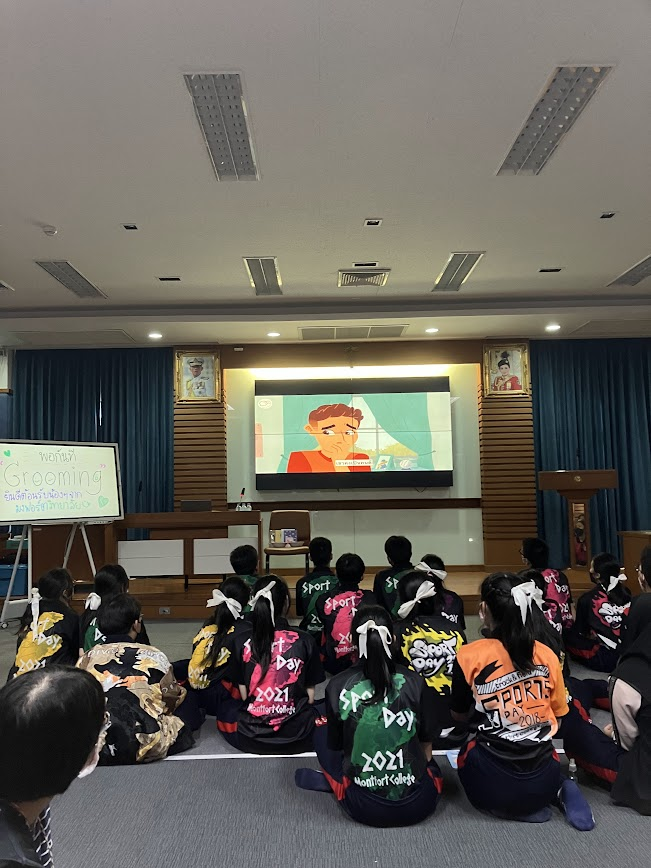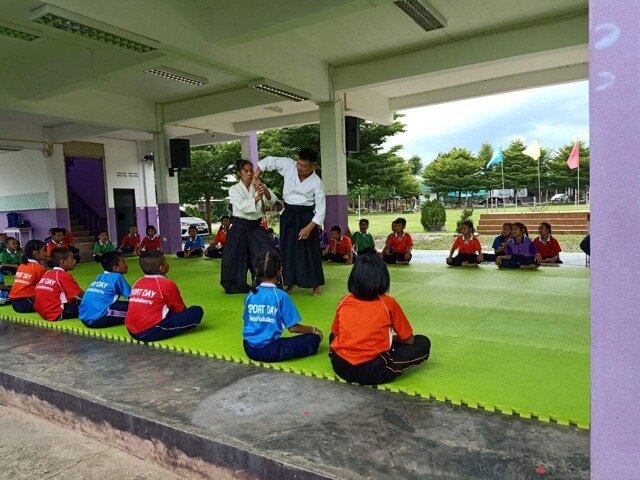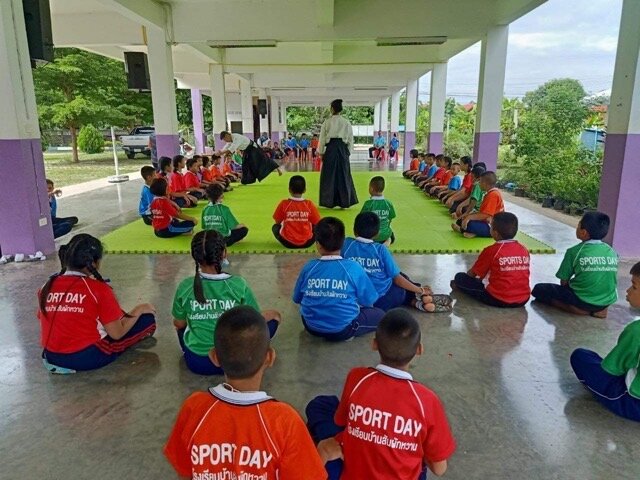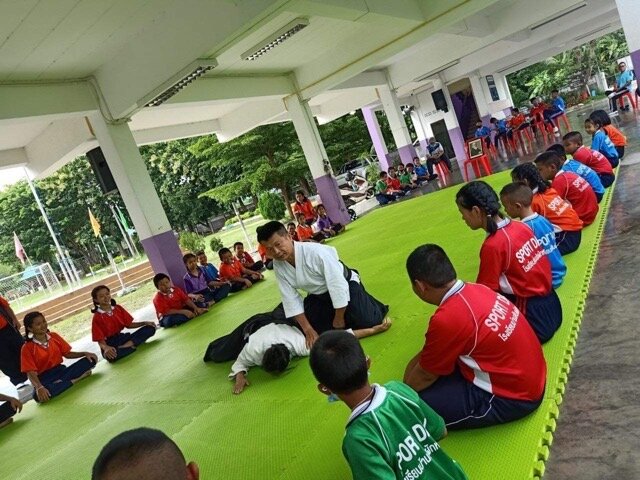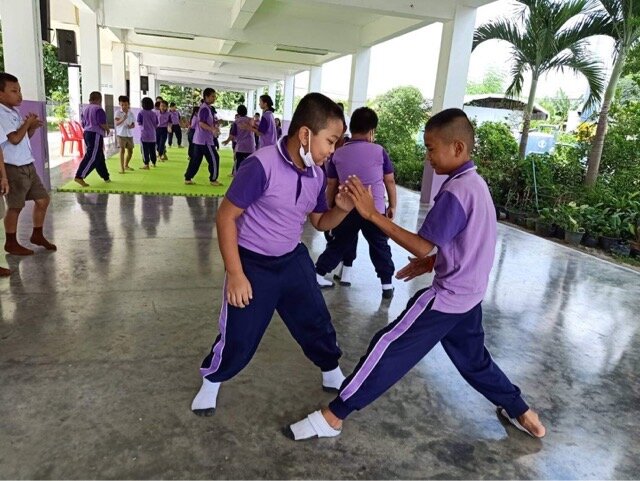PROJECTS
2023 - Present
Project for Preventing Sexual Abuse in Schoolchildren: No More Grooming (Train-the-Trainer) Program for Facilitators
Objectives
To train high school student facilitators with the skills, knowledge, and understanding of grooming risks through the “No More Grooming” training manual, part of the curriculum on preventing sexual abuse in schoolchildren. The manual serves as a resource to raise awareness, enhance prevention and response capabilities, and foster effective strategies. Additionally, the trained facilitators will implement follow-up school projects, disseminating the knowledge within their communities, with support from the Peace Culture Foundation.
The Essence of the Project: Peer Advocacy
A 2022 survey on children and online risks (conducted with 31,965 children aged 9-18 by the Internet Foundation for the Development of Thailand in collaboration with COPAT) revealed that 35% of children who experienced online grooming chose to confide in a trusted friend before approaching parents, family, or other adults. This underscores the importance of empowering "peer-to-peer communication." It is crucial for children and youth to comprehend grooming, acquire skills to share knowledge through peer advocacy, and understand the pathways for seeking support from relevant organizations.
Project Progress
In 2024, the Peace Culture Foundation has successfully conducted training for 11 cohorts of student facilitators, totaling over 440 participants, across Chiang Mai, Bangkok, and the five southern border provinces. These achievements have been made possible through collaboration with various partners, including the Thailand Rotary Action Group Against Slavery Team (TRAGAST), the Chiang Mai Provincial Social Development and Human Security Office, the Chiang Mai Provincial Child and Youth Council, the Department of Children and Youth, UNICEF Thailand, as well as numerous universities, schools, and organizations dedicated to raising awareness about grooming.
We remain steadfast in our mission to train more student facilitators under the "No More Grooming" program, ensuring that knowledge is effectively disseminated to every corner of Thailand. Support us!
2022 - present
“No More Grooming” Workshop for Lower and Upper Secondary Students
Objectives
To understand "grooming" and its behavioral stages, fostering awareness and vigilance toward potential situations.
To explore strategies and foster collaboration for effective grooming prevention.
To encourage the dissemination of knowledge about grooming within personal networks.
To enhance problem-solving skills through peaceful and non-violent approaches.
Background
The project commenced in June 2022 and, as of 2024, has engaged over 1,400 secondary students from 17 schools in Chiang Mai province. The project continues to expand its reach, aiming to raise grooming awareness across as many schools as possible. Support us!
Activity Structure
The “No More Grooming” workshop integrates practical, interactive activities with real-life scenarios to address grooming risks. The content is tailored into two curricula for lower and upper secondary levels to ensure age-appropriate comprehension. This workshop aim to instill awareness and vigilance about grooming in both offline and online environments. The program has received overwhelmingly positive feedback, with post-workshop evaluations consistently rated as excellent. Field data collected during the workshops has proven invaluable for implementing measures to prevent sexual abuse. Furthermore, the project has facilitated timely intervention and collaboration with government agencies to support individual students facing grooming-related issues.
2020 - 2023
Cultivating Sustainable Peace Culture in School
This project is funded by Global Grant from Rotary International via Rotary of Bangkok.
Objectives
This three-year project focuses on cultivating prosocial attitudes, values and behavior in a small elementary school in a rural area of Chiang Mai, Thailand. Students are encouraged to develop positive aspects of their character with the support of their parents and teachers. Through the program, a culture of peace will be fostered, where people treat one another with respect and kindness and are ready to help rather than to take advantage of others.
It is highly likely that after three years the values of non-violence and peaceful co-existence will become a strong characteristic of the school. Following final evaluation, scaling up the project to other schools and institutions is forseeable.
Background
Research studies show that human tendency towards violence and aggression is largely ‘learned’ through modeling, witnessing, and being subjected to forms of violence. Children growing up with repeated exposure to violence and aggression tend to absorb such values and pass them on in their relationships and interactions with others. As they enter young adulthood, start their own family, and raise their children the vicious cycle gets perpetuated. This in known among mental health professionals as ‘intergenerational transmission of violence and trauma’.
When enough people in a given community hold such beliefs and values, the dominant culture is one where the use of violence and aggression is viewed as justifiable and accepted. It can be manifest in forms of harsh discipline by parents and teachers, the use of violence to resolve conflicts, bullying behavior, abuse and sexual assault. Violence in society may range from interpersonal violence to collective violence such as war, colonialism, slavery, systematic labor and economic exploitation and human trafficking, ethnic cleansing or genocide, and even violence towards the environment.
Structure
Program initiatives and training programs aim to eliminate violence from the school; cultivate peace culture; and train future leaders. Initiatives include:
Baseline assessment of school status quo on violence;
Trainings for parents and teachers on eliminating punishment and bullying through positive discipline, interpersonal violence prevention, and bullying prevention;
Trainings for students on peer mediation and conflict resolution skills;
Establishment of a mediation center in the school;
Training workshops on peace building;
Trainings for student leaders and teachers to become facilitators to maintain the program beyond the project period;
Final evaluation.
Beneficiaries
Students, parents and teachers at a small elementary school in a rural area of Chiang Mai. Most of the students, ranging in age from kindergarten to grade six, are from Shan migrant worker families with low income. As a whole-school program, beneficiary stakeholders include:
180 students
360 parents
14 teachers
10 school board members who are community leaders
Community members and local government officials who may learn from the project













